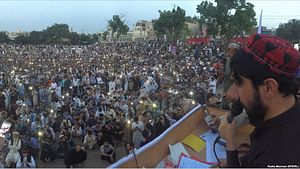Pakistan Army’s spokesperson, Major General Asif Ghafoor, has warned the leadership of the Pashtun Tahaffuz Movement (PTM) that their “time is up.” Ghafoor dedicated most of his press conference on April 29 to the PTM – a nationalist movement dedicated to safeguarding the rights of the Pashtun community – accusing the group of receiving funds from Indian and Afghan intelligence agencies.
While Ghafoor failed to substantiate his allegations, he laid the onus of disproving the Army’s claims against the PTM on the movement’s leadership. He put forth a questionnaire for the PTM, demanding answers regarding the group’s responsibilities in the tribal areas, their overseas activities, collaborators in Kabul and New Delhi, narrative against the military, and income sources.
At the same time, Ghafoor categorically told the media not to invite the movement’s leadership on their channels to answer his own questions, amid the continued blanket ban on covering the PTM. In the same press conference, the spokesperson had earlier said with a straight face that the Army does not tell the media what to air and what not to air.
When Member of the National Assembly (MNA) Mohsin Dawar, a PTM leader, tried to respond to the Army spokesperson’s questions, his speech was cut short by the NA speaker. But there was enough time for Dawar to express his readiness for accountability, asking the military establishment if it could similarly come clean.
On April 26, the PTM’s elected MNAs from Waziristan, Dawar and Ali Wazir, weren’t allowed to hold a press conference at the Islamabad Press Club, where they were going to address similar accusations that Prime Minister Imran Khan had levelled against them during a rally in the Orakzai tribal district on April 19.
It is no coincidence that Khan had echoed the Army’s allegations against the PTM, given that the Pakistani premier owes his own office to the military establishment’s manipulation of last year’s elections. He is now toeing the Army’s line in formally declaring war on Pashtun nationalism.
The most ominous declaration of war came in Ghafoor’s press conference, when he responded to a question about missing persons in the country by saying that “everything is fair in love and war.” The military establishment has long used extrajudicial abductions, and executions, to exercise its autocratic control over the country’s volatile regions – most notably Balochistan.
The return of missing persons is one of the demands of the PTM as well. The movement asks for the right to life and liberty for the Pashtun people, who continue to suffer the ramifications of state’s duplicitous security policy, which used the tribal areas as an experimentation ground for its jihad-mongering for decades.
The fact that it has taken over seven decades for Pakistan to begin merging the tribal areas with the rest of the country underlines the state’s masochistic need for lawlessness and the denial of constitutional rights in the former Federally Administered Tribal Areas, where the British colonial-era Frontier Crimes Regulation of 1901 (FCR) was under implementation until May 28, 2018.
The rise of a nationalist movement for the local Pashtun population is the natural corollary of the humiliation they have had to suffer for decades through the FCR’s collective responsibility and ethnic discrimination at check-posts, along with the homelessness endured by over a million locals owing to a war that was imposed on them by the state.
Last year’s extrajudicial killing of Naqeebullah Mehsud provided the spark that gave rise to the Pashtun spring and the emergence of the PTM, which continues to demand justice for Mehsud’s murder, along with the safeguarding of the constitutional rights of the Pashtun community.
Given the uncanny parallels with the state’s treatment of the Bengali population before East Pakistan became Bangladesh in 1971, or indeed the continued violent subjugation of Baloch nationalism, the Pakistani state’s treatment of the PTM was always going to be the litmus test for the incumbent leadership’s claims of distancing itself from its past.
The result of that test is now abundantly clear. The civil and military leadership has collectively dubbed the PTM leaders “RAW agents,” referring to India’s intelligence agency. That is a tag still used in popular Pakistani narratives regarding Bangladesh’s founder Sheikh Mujibur Rahman, Baloch nationalists, and basically anyone who questions the state’s policies – with “the state” being synonymous with the all-powerful Pakistan Army.
The Pakistan state habitually touts any emerging ethno-nationalist movements as a threat to national unity, remaining completely oblivious to the reality that it is actually through addressing valid grievances, like the ones that the PTM has taken up, that the state can overcome centrifugal forces and maintain its integrity.
The military leadership’s idea of unity, however, lies in monolithism. This is why the establishment is currently flirting with the idea of undoing the federation and bringing forth a presidential system, with a civilian stooge at the helm.
The enforcement of such a monolithic, and primitive, idea of unity requires discrediting elected leaders such as Dawar and Wazir as not being “true representatives” of the locals’ sentiments. Similarly, the large following present at PTM rallies led by its chairman Manzoor Pashteen is being dismissed as foreign-funded “manipulation,” according to Asif Ghafoor, which is representative of the establishment’s inherent disregard, nay disdain, for popular public desire.
What those issuing threats don’t realize is that they are addressing representatives of a generation that has grown up amid war brutalities. They won’t be silenced by military drums and implicit, or explicit, calls to violence.
Their time isn’t up. Their time has finally come.

































